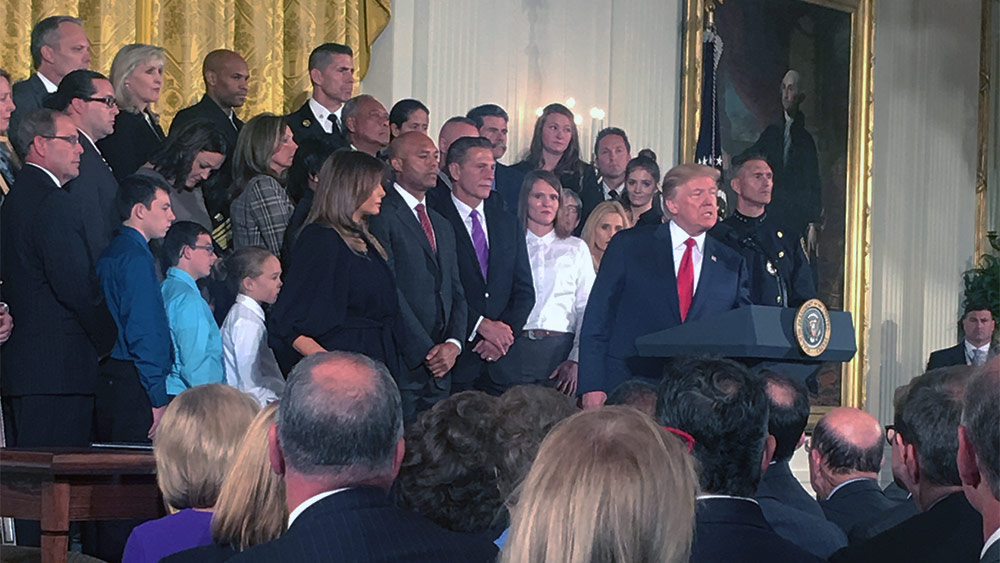WASHINGTON (Oct. 26, 2017)—President Donald Trump on Thursday announced before a packed White House East Room that the opioid epidemic is a public health emergency.
"It's time to liberate our communities from this scourge of drug addiction," Trump said, flanked on a stage by recovering addicts, children, parents of overdose victims, first responders and medical professionals. "We can be the generation to end the opioid epidemic."
By declaring the opioid crisis as a public health emergency, the president has helped to ease federal regulations and opened up a small amount of federal funds to states.
The declaration also permits increased telemedicine services, such as remote prescribing. The Department of Health and Human Services also will be able to expedite temporarily appointing specialists and the Department of Labor will be authorized to issue dislocated worker grants for those affected by the epidemic.
In addition, those eligible within HIV/AIDS programs will be eligible to receive substance abuse treatment, according to a White House background paper.
Trump cited "the scale of this crisis of addiction," which now claims nearly 200 American lives per day, in his decision to create the President's Commission on Combating Drug Addiction and the Opioid Crisis.
"We await the final report, which will come in next week," he said. "Some of the things they're recommending are common sense, but are important steps."
"I want the American people to know that the federal government is aggressively fighting the opioid epidemic on all fronts," Trump said.
New Jersey Gov. Chris Christie, the chairman of the commission, was among numerous governors, senators, House members and state attorneys general in the audience for the president's announcement.
First Lady Melania Trump told the audience about her visits with victims of drug addiction, emphasizing that "this can happen to any of us."
"Drug addiction can take your friends, neighbors, or your family," she said. "No state has been spared and no demographic has been untouched, which is why my husband and his administration has dedicated itself to combating this health crisis by using every resource available."
Clay Stamp, executive director of the Maryland Opioid Operational Command Center, said in a statement that "it will take a nationwide effort by the federal government in support of the states' efforts to combat this national crisis."
"We look forward to continued and expanded collaboration with our federal partners to address this epidemic from every angle—prevention, treatment, and enforcement," Stamp said.
Some Maryland Democrats in Congress, led by Rep. Elijah Cummings of Baltimore, said before Trump's announcement, that his declaration would fall short of the recommendations of the presidential commission.
In a September interim report, Trump's commission implored the president to, "provide model legislation for states to allow naloxone dispensing via standing orders, as well as requiring the prescribing of naloxone with high-risk opioid prescriptions; we must equip all law enforcement in the United States with naloxone to save lives."
The report said of naloxone: "It is the first line of defense in many parts of our country; if we lose someone to overdose we obviously have no chance to treat them and return them to a productive life."
Cummings wrote in an op-ed in The Afro on Wednesday that Trump had not responded to a letter he and 50 House colleagues—including Maryland Democratic Reps. Jamie Raskin of Kensington, Dutch Ruppersberger of Timonium and John Sarbanes of Towson—urging the president to follow his opioid commission's recommendations.
"This is inexplicable," Cummings wrote. He noted that Trump's commission "explicitly advised the president to 'declare a national emergency' and 'immediately negotiate lower prices to get the lifesaving drug, naloxone, into the hands of law enforcement and first responders across the country.'"
In Maryland, Republican Gov. Larry Hogan first declared a state of emergency for the heroin and opioid epidemic in March, and he has renewed the designation in each ensuing month.
But the state continues to reel from the opioids scourge, with 156 more opioid-related overdose deaths through June, compared to the same period in 2016, according to Maryland Department of Health and Mental Hygiene data released Tuesday.
While heroin-related deaths have steadied, with only seven more deaths through the first two quarters of 2017, deaths related to fentanyl, a potent synthetic opioid up to 50 times stronger than heroin, have skyrocketed.
Fentanyl-related deaths statewide surged from 469 from January through June in 2016, to 799 deaths over the same time in 2017—a 70 percent increase.
Furthermore, a new drug threat has emerged in Maryland: carfentanil, a fentanyl derivative commonly used to sedate large mammals like elephants. There have been 46 carfentanil-related deaths over the first two quarters of 2017 compared to none over the same period last year.
Pres. Trump Declares Opioids 'Public Health Emergency'

WASHINGTON--President Donald Trump declares that opioids are a "public health emergency" during an appearance in the White House East Room. (Photo: Ashley Clarke)


